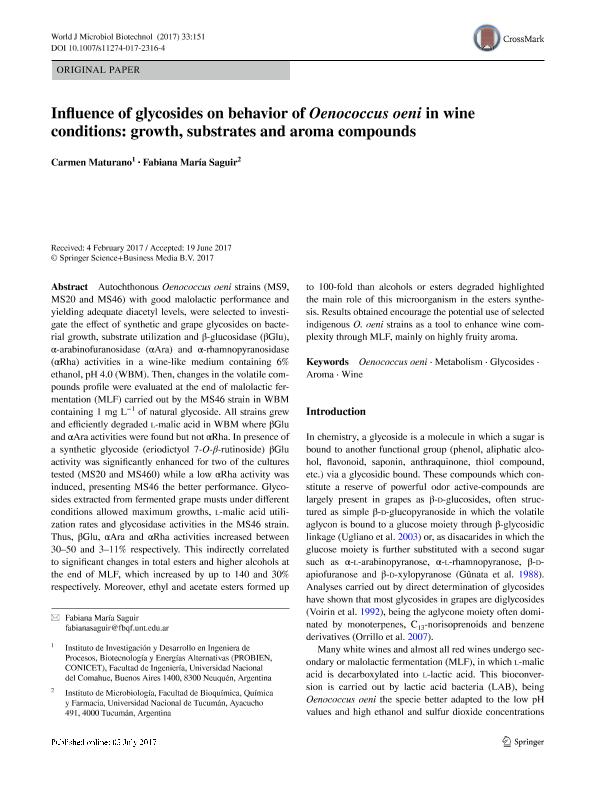Artículo
Influence of glycosides on behavior of Oenococcus oeni in wine conditions: growth, substrates and aroma compounds
Fecha de publicación:
03/08/2017
Editorial:
Springer
Revista:
World Journal of Microbiology
ISSN:
0959-3993
Idioma:
Inglés
Tipo de recurso:
Artículo publicado
Clasificación temática:
Resumen
Autochthonous Oenococcus oeni strains (MS9, MS20 and MS46) with good malolactic performance and yielding adequate diacetyl levels, were selected to investigate the effect of synthetic and grape glycosides on bacterial growth, substrate utilization and β-glucosidase (βGlu), α-arabinofuranosidase (αAra) and α-rhamnopyranosidase (αRha) activities in a wine-like medium containing 6% ethanol, pH 4.0 (WBM). Then, changes in the volatile compounds profile were evaluated at the end of malolactic fermentation (MLF) carried out by the MS46 strain in WBM containing 1 mg L−1 of natural glycoside. All strains grew and efficiently degraded l-malic acid in WBM where βGlu and αAra activities were found but not αRha. In presence of a synthetic glycoside (eriodictyol 7-O-β-rutinoside) βGlu activity was significantly enhanced for two of the cultures tested (MS20 and MS460) while a low αRha activity was induced, presenting MS46 the better performance. Glycosides extracted from fermented grape musts under different conditions allowed maximum growths, l-malic acid utilization rates and glycosidase activities in the MS46 strain. Thus, βGlu, αAra and αRha activities increased between 30–50 and 3–11% respectively. This indirectly correlated to significant changes in total esters and higher alcohols at the end of MLF, which increased by up to 140 and 30% respectively. Moreover, ethyl and acetate esters formed up to 100-fold than alcohols or esters degraded highlighted the main role of this microorganism in the esters synthesis. Results obtained encourage the potential use of selected indigenous O. oeni strains as a tool to enhance wine complexity through MLF, mainly on highly fruity aroma.
Palabras clave:
Aroma
,
Glycosides
,
Metabolism
,
Oenococcus Oeni
,
Wine
Archivos asociados
Licencia
Identificadores
Colecciones
Articulos(PROBIEN)
Articulos de INST. DE INVESTIGACION Y DES. EN ING. DE PROCESOS, BIOTECNOLOGIA Y ENERGIAS ALTERNATIVAS
Articulos de INST. DE INVESTIGACION Y DES. EN ING. DE PROCESOS, BIOTECNOLOGIA Y ENERGIAS ALTERNATIVAS
Citación
Maturano, Ramona del Carmen; Saguir de Zucal, Fabiana Maria; Influence of glycosides on behavior of Oenococcus oeni in wine conditions: growth, substrates and aroma compounds; Springer; World Journal of Microbiology; 33; 8; 3-8-2017; 1-12
Compartir
Altmétricas




